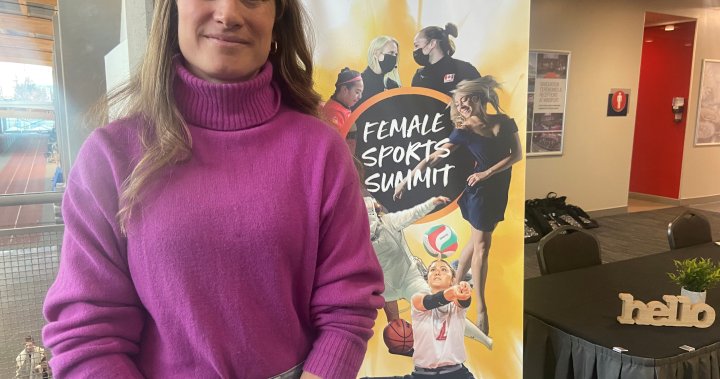A Calgary Olympic canoeist who broke gender barriers in her sport is speaking out about the importance of fighting for what you believe in.
Haley Daniels was speaking at the 2024 Female in Sport Summit on Saturday in Calgary.
She competed at the 2020 Summer Olympics in Tokyo and made history.
Women’s canoe/kayak events had previously been excluded from the Games.
“We had to fight for 12 years to become gender equal. I learned that you have to believe in a cause even when a lot of people don’t believe in it. You have to be authentic,” Daniels said.
Daniels was part of the group of women who competed when women’s canoe/kayak finally made an Olympic debut in Tokyo.
Daniels represented Canada in the Tokyo 2020/2021 Olympics in the sport of Canoe Slalom.
She is a multi-time Canadian Champion where she won a bronze medal at the Toronto 2015 Pan American Games, a gold medal at the 2018 Pan American Championships, and competed in World Cups, and World Championships.
She said it was hard to go to training some days when she had no idea if her dream would ever actually come to fruition
“I felt so proud to be at the start line because I knew I was part of that legacy for future women canoeists to come,” Daniels said.
“I had a lot of doubt. There were a lot of times when I had no idea if we were going to be added to the Olympic Games. It took a lot of trusting in blind faith and knowing there were enough people that supported me and globally there were canoeists that believed us.”
Get the latest National news.
Sent to your email, every day.
Daniels said there have been some major strides that have been happening with the women’s professional soccer league and the women’s professional hockey league but more needs to be done.
“We need to continue those conversations we need to continue to look at how we have equal pay and equal opportunity,”
“According to the International Olympic Committee, everything is gender equal, but just because there is gender equality in terms of representation on the field doesn’t mean that there is equality in terms of how much sponsorship dollars there are and how much funding there is. So, although there’s representation in competition on paper, there is no representation in terms of sponsorship dollars and salaries. Things like still need to change.”
Her parent, Kimberly Daniels, was at the Tokyo games as the first openly transgender Olympic judge. Kimberly came out in 2020 as a transgender woman.
“My dad lived the majority of her life as someone who she did not feel comfortable being. It took her until 65 years old to come out authentically. If you can do that earlier in your life it’s a lot easier and you can create that space for yourself,” Daniels said.
She says both she and her parent are diversity and inclusion advocates.
“It’s allowed us to support gender equality in sport and to continue that conversation so that it’s something that is comfortably talked about,” Daniels said.
“Sport is the most exclusive field in general. We can have gender-neutral bathrooms in corporate (settings). We can be gender-neutral in various things, but in sports, there’s a male category and a female category. It’s black and white. There’s no other category,” Haley said.
“But when it comes to competitive sport, getting to the higher level, that’s where there are regulations. All we can do is rely on science at this point in terms of regulation and try to find an objective way that everyone can race or compete,” Daniels said.
She says it’s important for athletes to continue to be authentic as hard as it can be.
“There is an amazing accepting community of people now and there are a lot fewer naysayers, but she’s going to have a challenge, but she also has to know that there are amazing allies and there are people that believe in her or him or them,” Haley said.
Haley said it takes a long time for the transition to happen.
“I think that’s why a summit like this weekend is so important because we can show the growth and the opportunity that has come because of courageous women,” Daniels said.
Her next role will be working at the Paris Olympics this year with broadcasting. She’s retired as an athlete and now works as a professional speaker and is an ambassador with KidSport Calgary, Protect Our Winters, Special Olympics, and WaterAid Canada.
Lauren Ritchie was also a keynote presenter at the Female Sports Summit in Calgary.
Ritchie said it’s important that athletes, parents and coaches take part in a conversation that is rooted in curiosity if we expect young people to continue sports into their adult years.
“What am I learning about myself and how am I developing myself as a human through the language of sports?” Ritchie said.
“How do we keep athletes engaged in their sports? If we hyper fixate on only the end results and only the final outcome and the final score and put added pressure where pressure already exists, we are more likely to experience that burnout and that frustration and the dropout rate increases,” Ritchie said
“The key for sports within youth is to have them deeply curious about what’s possible for them. How they want to start to build those skills in high stress environments. Can we use sport as the language to help ourselves grow as a person,” Ritchie said.



